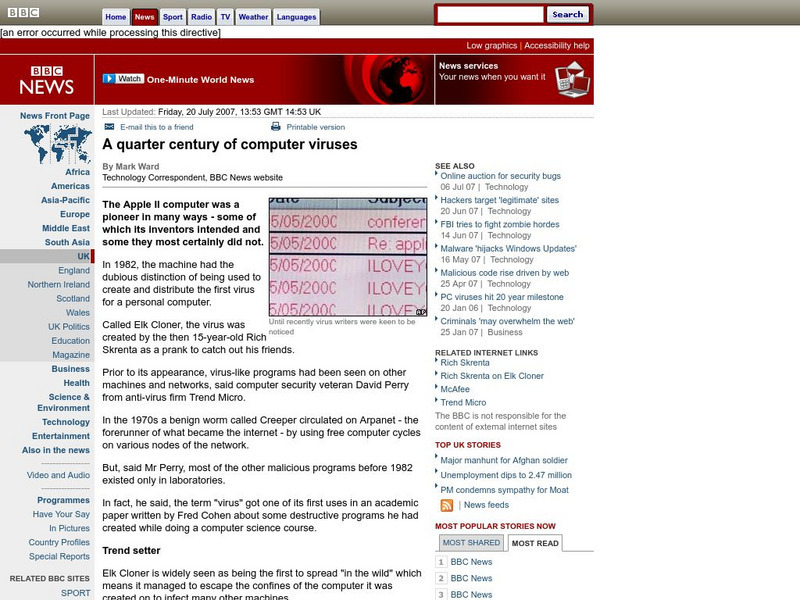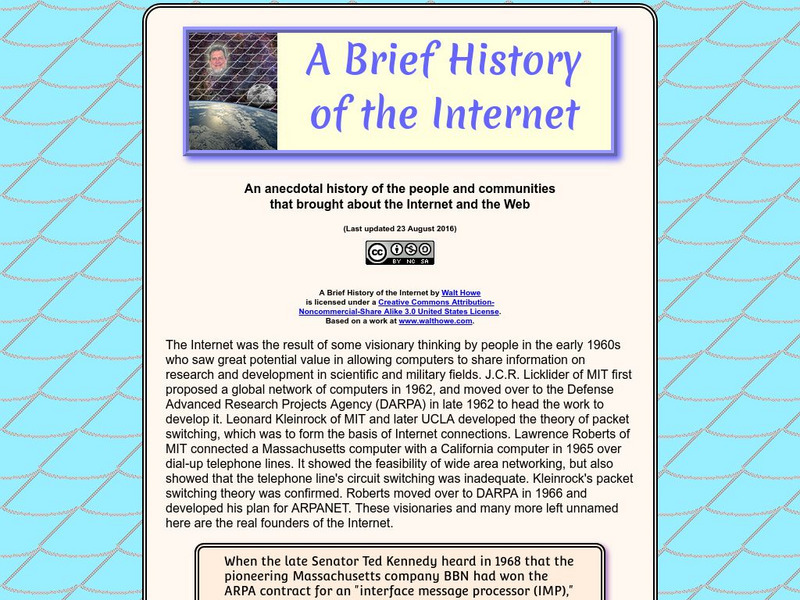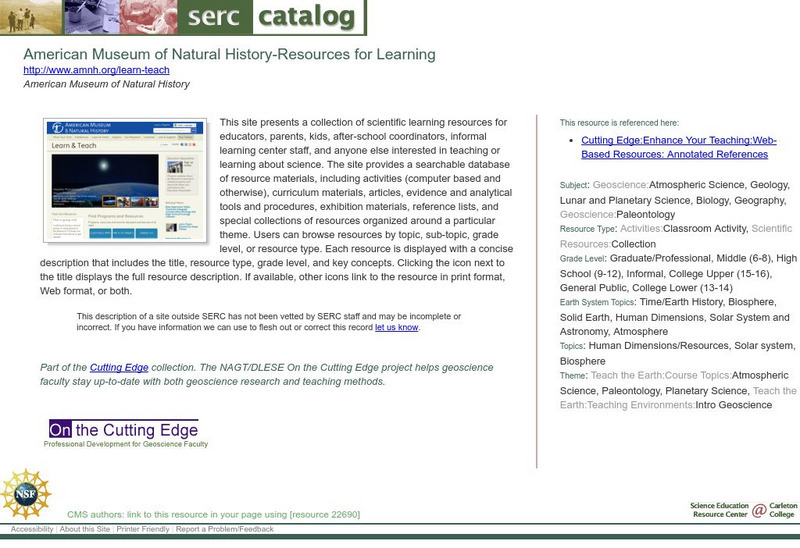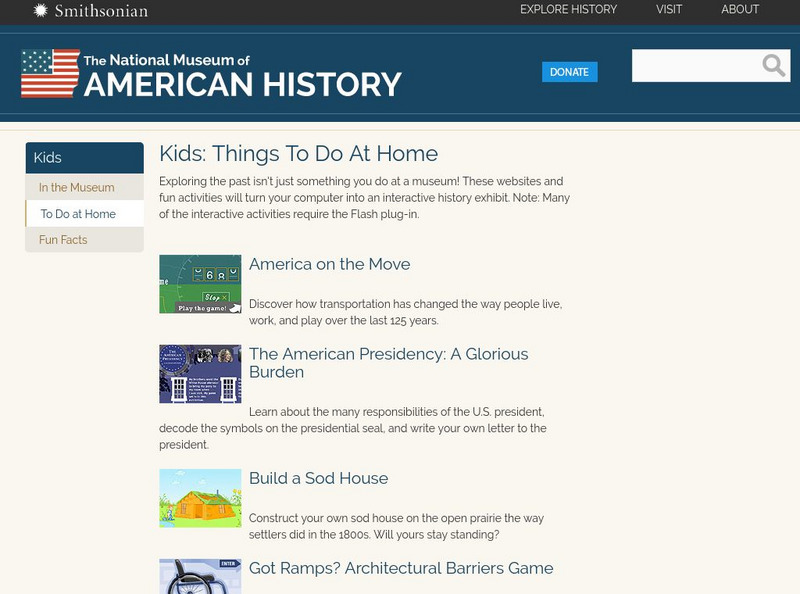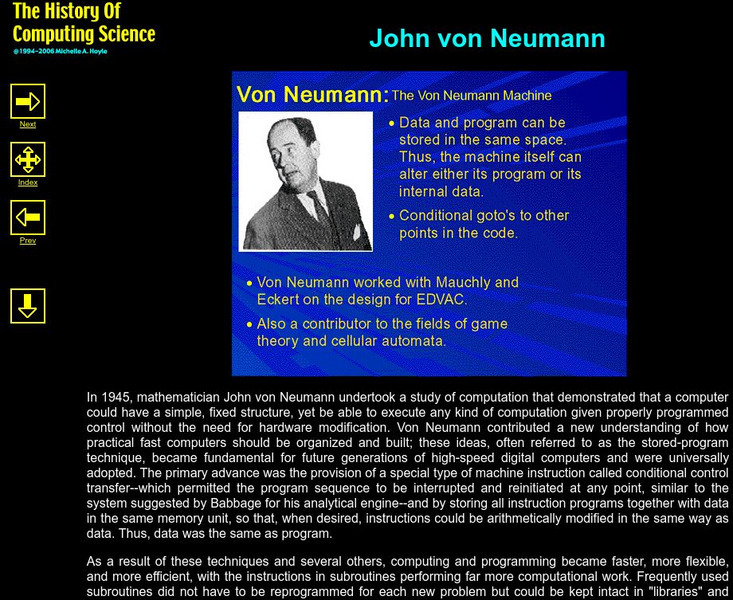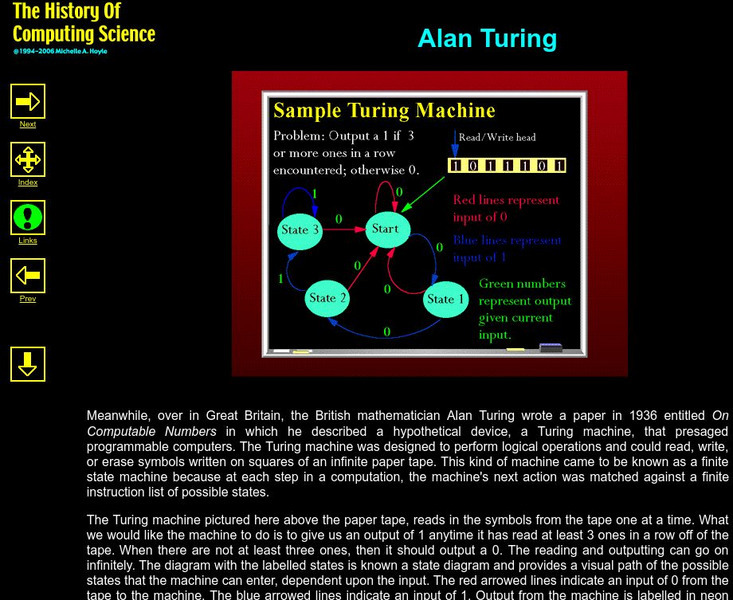PBS
Pbs: A Science Odyssey
Website for the PBS series "A Science Odyssey." Numerous opportunities to explore the people and discoveries of science.
National Women’s History Museum
National Women's History Museum: Getting With the Program
American women's contributions to the invention and formation of computer programing.
BBC
Bbc: Science & Nature Hot Topics Computer Viruses
This BBC "hot topic" contains a description of the types of computer viruses. It also provides different ways to prevent or eliminate computer viruses.
National Science Foundation
National Science Foundation: The Birth of the Internet
This visually engaging feature by the National Science Foundation provides an excellent explanation of how the internet came to be and those responsible for it's inception. Many original computers and other instruments are discussed and...
History of Computing Science
History of Computing Science: Past Computer History
An in-depth lecture and PowerPoint slideshow on the history of computing can be found here. It gives an overview of the advances in science that made desktop computers possible, starting with the invention of counting, to the...
East of England Broadband Network
History's Heroes: Alan Turing (1912 1954)
This website explores the lives of heroic ordinary people who made their mark on history. Features illustrated story and timeline on Alan Turing, the father of modern computing. Find out who he was, what he did, his achievements, and his...
A&E Television
History.com: Inventions & Science
Inventions from the telephone to the Model T and the computer have defined human history, and inventors like Leonardo da Vinci, Nikola Tesla, Thomas Edison, Eli Whitney and Alexander Graham Bell have transformed our society.
Other
London Grid for Learning: History of Computing: A Brave New World
This resource aims to teach the history of computing and the effect of landmark moments in computing history on today's world. Crosses different curriculum areas. Explanations of many of the world's significant computers were provided by...
Science Buddies
Science Buddies: Can Gaming Help You Score Better in School?
There are a variety of educational computer games on the market in the areas of math, history, science, and language, as well as many simpler versions free on the Internet. This exercise asks that you make up a test based on the subject...
Digital Public Library of America
Dpla: Women in Science: Space Exploration
Through primary source documents, discover the history of NASA's "human computers," early aerospace industry pioneers, and the struggle for American women to be allowed into the astronaut program.
TED Talks
Ted: Ted Ed: A Brief History of Video Games (Part I)
Video games are everywhere these days, but where did they actually come from? The history of video games is a complicated story that involves giant computers in science labs, the founder of Chuck E. Cheese and billions of dollars in...
Other
Internet Learning Tree: A Brief History of the Internet
An anecdotal history of the people and communities that brought about the internet.
Science Museum, London
Science Museum: Ada Lovelace
Some say that Ada Lovelace was the first programmer because she wrote instructions for a computing device designed by Charles Babbage. This site presents a brief history of Ada's life and the important role she played in the history of...
Science Education Resource Center at Carleton College
Serc: American Museum of Natural History Resources for Learning
This site presents a collection of scientific learning resources for educators, parents, kids, after-school coordinators, informal learning center staff, and anyone else interested in teaching or learning about science. The site provides...
Smithsonian Institution
National Museum of American History: Things to Do at Home
Families can come together through games designed to make history something fun and integral to family life. Build a sod house like prairie settlers did in the 1800s. Go back in time to visit five families that lived in the same house...
Other
Rutgers Marine & Coastal Sciences: Cool Classroom
Students and teachers can explore the work of marine scientists and observe the ocean from their computers. Learn about Rutgers Coastal Ocean Observation Laboratory, discover why oceanography is important, and see what life is like in...
History of Computing Science
History of Computing Science: Harvard Mark I
The Harvard Mark I computer was the first large-scale automatic digital computer in the USA. This lecture provides a brief description of the Harvard Mark I computer.
History of Computing Science
History of Computing Science: John Von Neumann
John von Neumann was a brilliant mathematician. His work impacted several fields of study. This lecture series provides a brief description of his life and contribution to computer science.
History of Computing Science
History of Computing Science: Alan Turing
Alan Turing is sometimes referred to as the father of modern computer science. This lecture series provides a brief description of his well-known contribution, the Turing Machine.
Other
Iae Pedia: Computational Thinking
Find some facts behind computational thinking, learn the history of this problem solving method, and understand how it affects different disciplines.
History of Computing Science
History of Computing Science: Charles Babbage
This is a brief biography of Charles Babbage, also known as the "Father of Computing".
PBS
Pbs Learning Media: Technology Over Time
In this interactive activity adapted from A Science Odyssey, learn how technology in the home has changed through the years. Scroll through a timeline from 1900 to 2010 to explore technological innovations in the home (such as...
National Library of France
National Library of France: Heaven and Earth
Learn how art through the ages has been influenced by the Earth and the heavens. See paintings that attempted to explain the Earth's creation from a scientific standpoint, sacred architecture that provided a place to worship the heavens,...
National High Magnetic Field Laboratory
Magnet Academy: Timeline of Electricity and Magnetism: 1940 1959
Defense-related research leads to the computer, the world enters the atomic age and TV conquers America.




